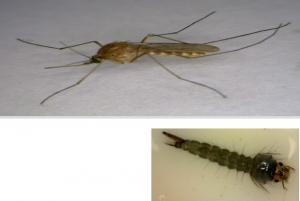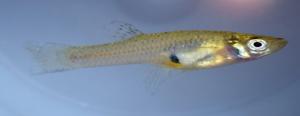A Fishy Business: Bacteria that Grow on Fish Skins Repel Mosquitoes

Dr. Alon Silberbush, project leader (photo: Oranim College)
Mosquitoes are a nuisance, and transmit deadly diseases. Scientists recently identified new and natural mosquito repellents – bacteria growing on fish skins.
QIRYAT TIVON, ISRAEL, May 30, 2023/EINPresswire.com/ -- Mosquitoes are a nuisance worldwide. They are also a huge health risk because they transmit deadly diseases such as malaria, dengue fever and the West Nile virus. Trying to learn from nature how to keep mosquitoes away, scientists recently identified new and natural mosquito repellents – bacteria that grow on the skins of fish.
Mosquitoes are insects that lead a 'double life'. Adult females live on land and feed on flower nectar and blood, but they lay their eggs in water. The immature mosquitoes develop in the water, eating small algae and bacteria.
Females choose their egg-laying sites carefully. This is because immature mosquitoes are attractive prey, so that egg-laying females would do well to avoid ponds where predators live. Fish are the most effective predators, and indeed mosquito females stay away from natural and artificial ponds that contain predatory fish. They even avoid laying eggs in water taken from fish tanks, but with no fish in the water. It seems that some chemicals, released from the fishes' bodies, act as mosquito repellents. Just what these chemicals are is still unknown.
Dr. Alon Silberbush from the Department of Biology and the Environment, University of Haifa- Oranim campus, suspected that microbes that live naturally on the skins of predatory fish might be involved in mosquito deterrence. He and his colleagues, Dr. Nimrod Shteindel and Prof. Yoram Gerchman, tested this idea in two ways. First, they treated Gambusia fish, ravenous mosquito predators, with an antimicrobial chemical. These fish, when placed in open outdoors aquaria, did not repel egg-laying mosquitoes at all. Then, they isolated several types of bacteria from the skins of the fish, and added them (either each bacterium separately, or as mixtures) to clean water containers without fish.
The researchers placed the containers outdoors for a few days and counted the mosquito eggs that were laid in them. Egg-laying mosquitoes avoided containers with one of these bacteria, Pantoea pleuroti, which is harmless to humans. This microbe apparently produces substances that discourage mosquito females from egg-laying. By doing so, the microbe reduces the feeding success of its fish host. Yet, since young mosquitoes feed on bacteria, it may be improving its own survival chances.
One can apply these findings to make the control of mosquitoes more sustainable than it is today. One way forward is to develop microbial products, tailored to repel specific mosquitoes, without harming other creatures in the water ponds.
The quest for environmental problem-solving drives teaching and research at the University of Haifa's Oranim campus. The Department of Biology and Environment has a leading role in training Israel's future environmental educators, conservation experts and researchers. Teaching-wise, the department believes in integrating classroom and laboratory instruction with hands-on fieldwork and research experience. Faculty research spans a wide range of creatures and organization levels. Examples for ongoing research projects include the conservation of plant diversity in tropical forests, the regulation of swarming in grasshoppers, and the management of wild boar populations in urban areas.
Israel is a hotspot of biological diversity, but it is also a densely populated country where humans and wildlife regularly come into contact and, sometimes, conflict. Reducing these conflicts in sustainable ways is part of the department's mission
Tali Laufer
Oranim College
email us here
Graduates of the department describe their study experiences
Legal Disclaimer:
EIN Presswire provides this news content "as is" without warranty of any kind. We do not accept any responsibility or liability for the accuracy, content, images, videos, licenses, completeness, legality, or reliability of the information contained in this article. If you have any complaints or copyright issues related to this article, kindly contact the author above.


